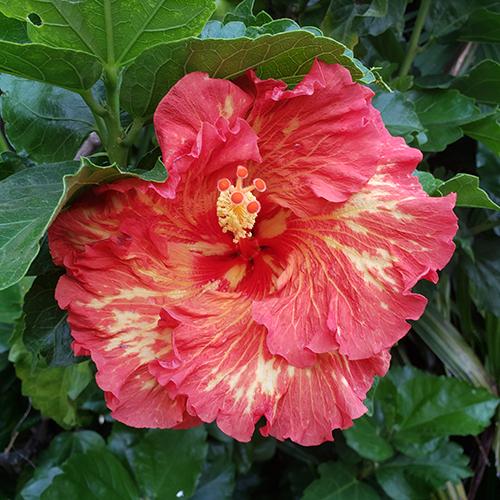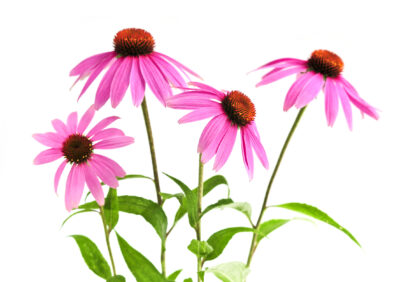
Benefits of Hibiscus
Hibiscus helped save our puppy We found a pedigree Golden retriever for sale for $50 in the local paper. At the time, they were selling

You probably know that zinc, vitamin D and vitamin C are gotta-have-its. How about herbal supplements such as echinacea, believed to boost the immune system and reduce symptoms of infections and other illnesses, including the common cold.
Echinacea (eh·kuh·nay·shuh) is a genus of herbaceous flowering plants in the daisy family native only in eastern and central North America, where they grow in wet to dry prairies and open wooded areas.
It includes several species, commonly called coneflowers that contain a complex mix of active substances. Some of which are said to have antimicrobial and antiviral properties, while others may support the immune system in other ways.
The three species of echinacea, Echinacea purpurea, Echinacea pallida, and Echinacea angustifolia, are the most commonly used for medicinal purposes, with Echinacea purpurea being the most researched.
Echinacea mucopolysaccharides (MPS) are a component of Echinacea. Like many other plants, all types of Echinacea contain phenols, substances that control the activity of a range of enzymes and cell receptors.
They protect the plants from infections and ultraviolet radiation damage, and they may have beneficial antioxidant properties.
Today, people around the world use products that contain Echinacea to support the treatment of a range of illnesses. In Germany, hundreds of herbal remedies contain this great herb.
Several laboratory and animal studies suggest that echinacea contains active substances that boost immune function, relieve pain, reduce inflammation, and have hormonal, antiviral, and antioxidant effects.
For this reason, your herbalist may recommend echinacea to treat urinary tract infections, vaginal yeast (candida) infections, ear infections (also known as otitis media), athlete’s foot, sinusitis, hay fever (also called allergic rhinitis), as well as slow-healing wounds.
Preliminary studies in the lab suggest echinacea may help inhibit colon tumors when combined with cichoric acid, a derivative of both caffeic acid and tartaric acid.
One study even suggests that echinacea extract exerted an antiviral action on the development of recurrent cold sores triggered by the herpes simplex virus (HSVI) when taken prior to infection.
The human body has trillions of cells, none of which touch each other. They are suspended in a gel that hyaluronic acid maintains at a particular semi-permeability that allows relatively small things such as liquids, gasses, water, amino acids and fatty acids but not viruses or bacteria.
When you get bit by a poisonous snake, besides the venom, it injects you with an enzyme, hyaluronidase, that breaks down the gel, allowing pathogens to invade and infect the cells
Echinacea inhibits this enzyme while strengthening the body’s production of hyaluronic acid thereby strengthening our immune defense.
Hyaluronidase a spreading factor also present in spider and bee venom and even the head of sperm cells. For this reason, echinacea is sometimes referred to as prairie doctor and snake root.
coughs and colds
In one review of over a dozen studies, scientists concluded that taking Echinacea
could reduce the risk of catching a cold by 58% and shorten the duration of a cold by 1.4 days.
bronchitis
upper respiratory infections
gingivitis
influenza
canker sores
yeast infections
ear infections
vaginitis
scarlet fever
syphilis
malaria
blood poisoning
diphtheria
some inflammatory conditions
HIV
AIDS
Archaeologists have found evidence that Native Americans may have used echinacea for more than 400 years to treat infections and wounds, and as a general “cure-all.”
Echinacea contains several chemicals that play a role in its therapeutic effects. These include polysaccharides, glycoproteins, alkamides, volatile oils, and flavonoids.
The chemicals contained in the root differ considerably from those in the upper part of the plant.
For example, the roots have high concentrations of volatile oils (odorous compounds) while the above-ground parts of the plant tend to contain more polysaccharides (substances known to trigger the activity of the immune system).
The combination of these active substances is responsible for echinacea’s beneficial effects, though research suggests that the above ground portion of Echinacea purpurea is the most effective.
Echinacea is one component of an antimicrobial we have found very effective.
Echinacea tea is a great option to take in cases of the cold or flu, as it relieves symptoms such as coughing and a runny nose.
Ingredients
1 teaspoon of echinacea root or leaves
1 cup of boiling water
Directions
Place 1 teaspoon of echinacea root or leaves in a cup of boiling water. Let it rest for 15 minutes, strain and drink twice a day.
Echinacea supports a healthy inflammatory response
When your body perceives a potential “opponent,” it rallies the troops, so to speak.
However, too much of that can be a bad thing, which is why it’s important to promote a healthy inflammatory response—which is exactly what echinacea was found to do, both in a study with mice, and in another study of adults with aging bones.
Follow these five tips to promote optimal immune function:
Get enough sleep. Regular, restful sleep encourages a strong immune response—so never skimp on those ZZZs!
Exercise regularly. Having a fitness routine isn’t just about getting a beach body; it also helps keep your immune cell function youthful.
Follow a nutritious diet. From mushrooms to pineapple to whey protein powder, certain foods promote immune health. (And, as an added bonus, most of them are delicious!) And don’t be afraid to add some spice! Garlic is well-known for its immune-supporting properties.
Get plenty of liquids. Being well-hydrated is key to overall health, which of course includes your immune system. Drink plenty of water, and if you want a hot beverage, try green tea, which not only encourages brain and heart health, but also may benefit your immune system.
Manage stress. —Whether it’s from a specific stressor in your life, or just the everyday hustle and bustle, finding healthy ways to manage stress will help you maintain a robust immune response.
People with tuberculosis, leukemia, diabetes, connective tissue disorders, multiple sclerosis, HIV or AIDS, any autoimmune diseases, or, possibly, liver disorders should not take echinacea.
There is some concern that echinacea may reduce the effectiveness of medications that suppress the immune system.
For this reason, people receiving organ transplants who take immunosuppressant medications should avoid this herb.
In rare cases, echinacea may cause allergic reactions, ranging from a mild rash to anaphylaxis (a life-threatening reaction accompanied by throat tightening, shortness of breath, and, possibly fainting).
People with asthma and allergies may be at an increased risk for developing these adverse reactions.
People with allergies to plants in the daisy family (compositae) should not take Echinacea without the supervision of a provider.
Minor side effects can include stomach upset, nausea, dizziness, and dry eyes.
Echinacea is available over the counter at pharmacies, health shops, and online — dried, in teas, as liquid extracts, or in capsules.
Check with a doctor before taking Echinacea or any other herbal supplement, as they can interact with ongoing treatments.
Teaching comprehensive holistic education since 1985.
We are currently offering interactive hybrid courses including Herbal Fundamentals, Energy Healing, Aromatherapy and Clinical Herbology
Hybrid means you may choose to participate in each individual class in the hybrid course online or in person.
All of our products are made with love from organic, all-natural and ethically sourced ingredients.
We began making and perfecting our own herbal remedies more than thirty years ago and offer our favorite products for purchase.

Hibiscus helped save our puppy We found a pedigree Golden retriever for sale for $50 in the local paper. At the time, they were selling
Hawthorn Berry Hawthorn is known as the heart herb for its many benefits as a heart tonic. The berry has been a key part of

Can you take herbal supplements to arm your immune system? You probably know that zinc, vitamin D and vitamin C are gotta-have-its. How about herbal

While attending San Diego State College in the early seventies, my work-study job was in the vivarium, a room for keeping and raising animals for